A Report on Quality Management Strategies for EasyJet Airline
VerifiedAdded on 2020/12/18
|11
|2944
|83
Report
AI Summary
This report provides an in-depth analysis of EasyJet's quality management practices within the context of the hospitality, tourism, and events industries. The report begins with an executive summary and an introduction that highlights the importance of customer service in the airline industry. The main body of the report addresses the problems EasyJet currently faces, particularly in terms of customer satisfaction and negative feedback. It evaluates EasyJet's capabilities and competencies to improve quality, including its financial performance and business strategy. The report then examines the impact of benchmarking on EasyJet's ability to deliver consistent and effective quality management, focusing on its low-cost strategy and online operations. The analysis includes a VRIO analysis to assess the airline's resources and capabilities. The report concludes with recommendations for improvement and emphasizes EasyJet's strengths and potential for sustainable performance in the competitive airline market, despite its challenges. The report underscores the airline's efforts to improve customer service and maintain a strong brand image through various strategic initiatives.
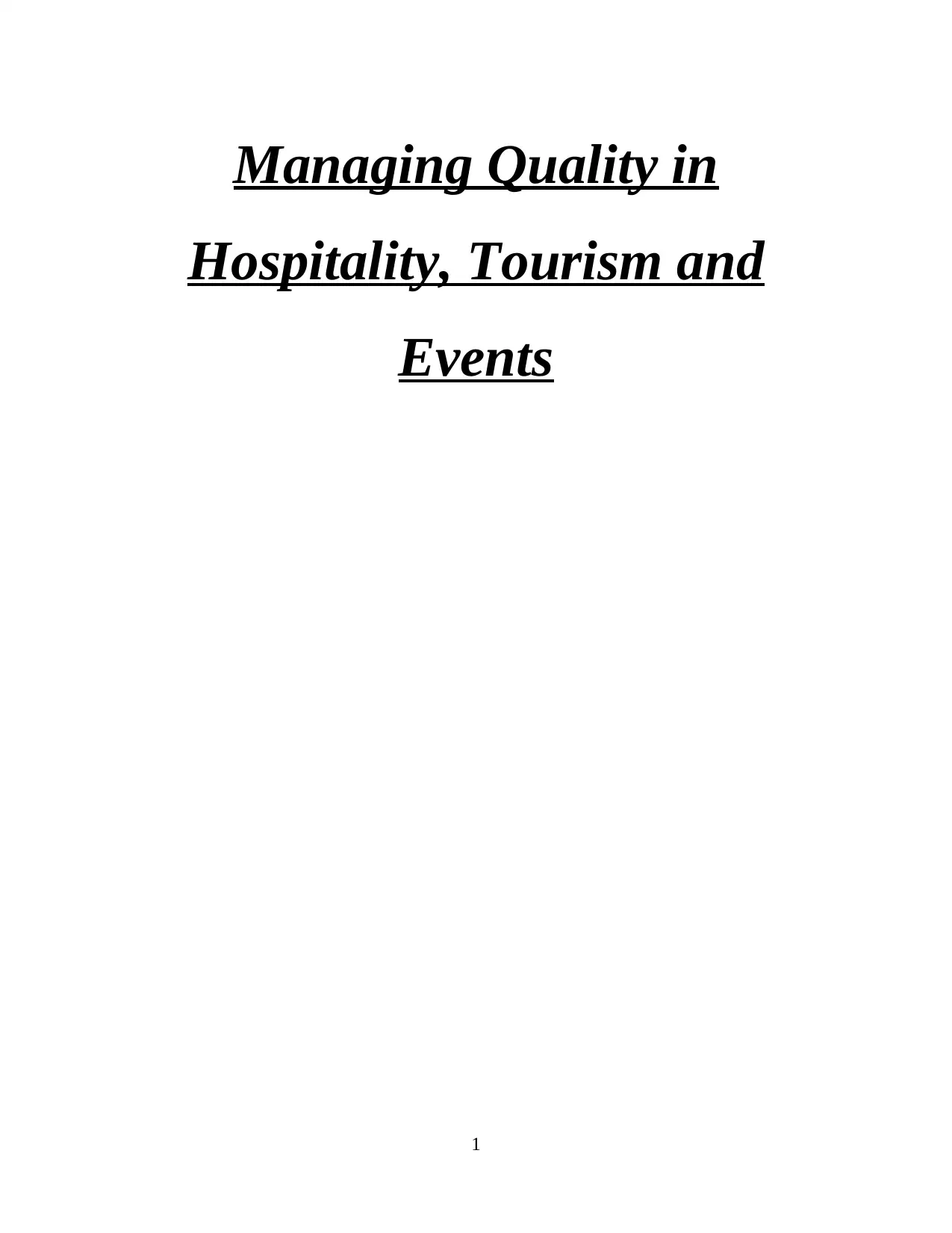
Managing Quality in
Hospitality, Tourism and
Events
1
Hospitality, Tourism and
Events
1
Paraphrase This Document
Need a fresh take? Get an instant paraphrase of this document with our AI Paraphraser
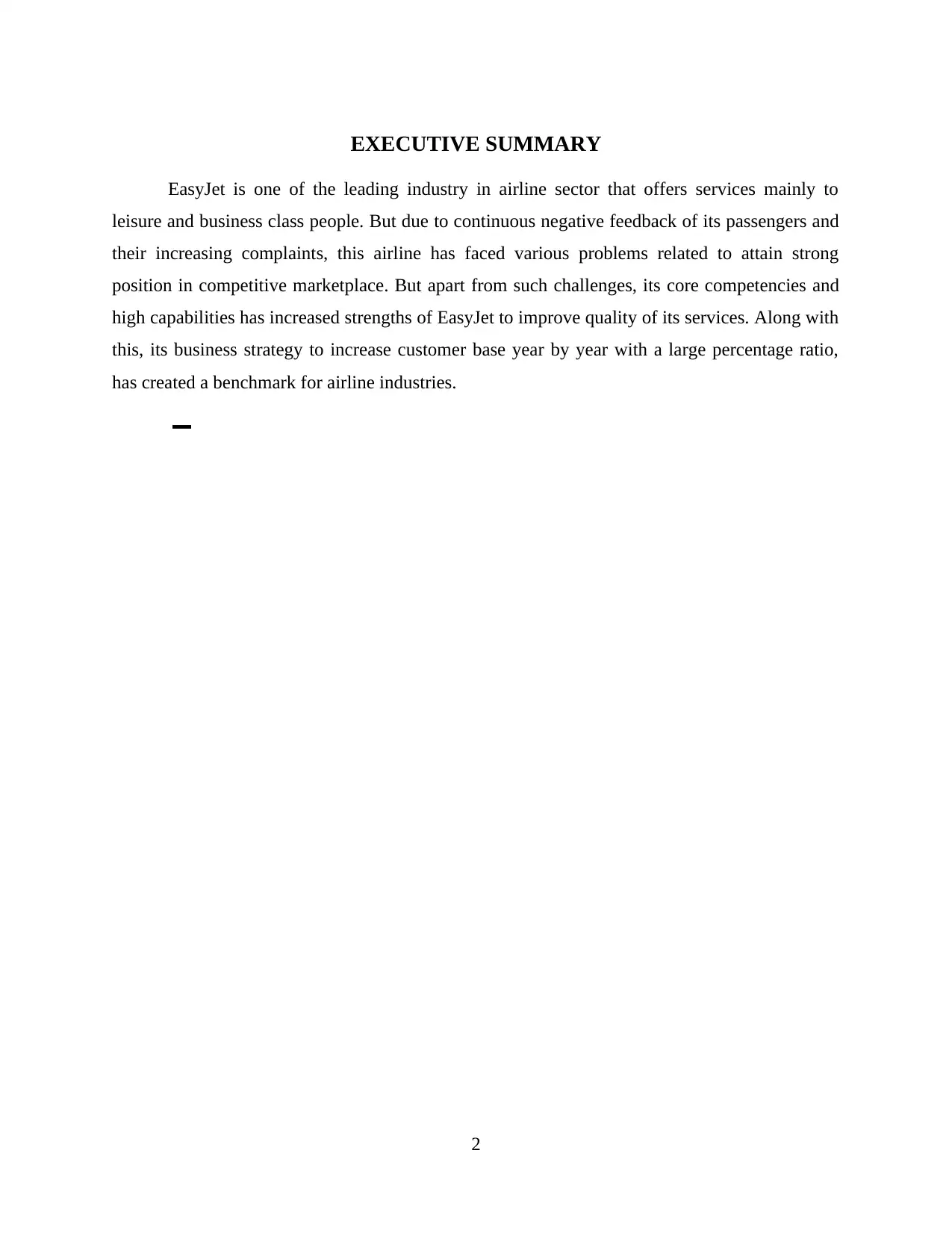
EXECUTIVE SUMMARY
EasyJet is one of the leading industry in airline sector that offers services mainly to
leisure and business class people. But due to continuous negative feedback of its passengers and
their increasing complaints, this airline has faced various problems related to attain strong
position in competitive marketplace. But apart from such challenges, its core competencies and
high capabilities has increased strengths of EasyJet to improve quality of its services. Along with
this, its business strategy to increase customer base year by year with a large percentage ratio,
has created a benchmark for airline industries.
2
EasyJet is one of the leading industry in airline sector that offers services mainly to
leisure and business class people. But due to continuous negative feedback of its passengers and
their increasing complaints, this airline has faced various problems related to attain strong
position in competitive marketplace. But apart from such challenges, its core competencies and
high capabilities has increased strengths of EasyJet to improve quality of its services. Along with
this, its business strategy to increase customer base year by year with a large percentage ratio,
has created a benchmark for airline industries.
2
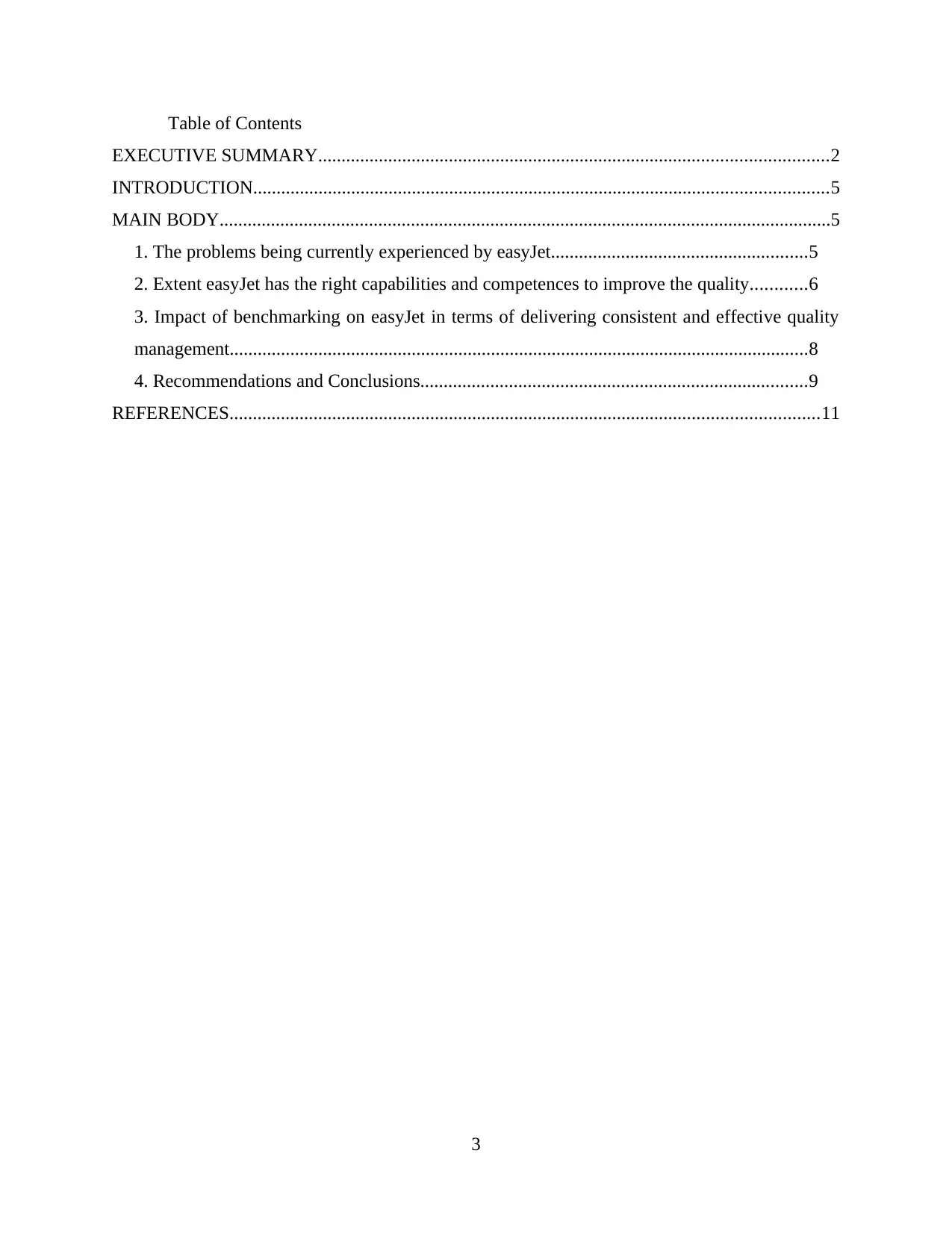
Table of Contents
EXECUTIVE SUMMARY.............................................................................................................2
INTRODUCTION...........................................................................................................................5
MAIN BODY...................................................................................................................................5
1. The problems being currently experienced by easyJet.......................................................5
2. Extent easyJet has the right capabilities and competences to improve the quality............6
3. Impact of benchmarking on easyJet in terms of delivering consistent and effective quality
management............................................................................................................................8
4. Recommendations and Conclusions...................................................................................9
REFERENCES..............................................................................................................................11
3
EXECUTIVE SUMMARY.............................................................................................................2
INTRODUCTION...........................................................................................................................5
MAIN BODY...................................................................................................................................5
1. The problems being currently experienced by easyJet.......................................................5
2. Extent easyJet has the right capabilities and competences to improve the quality............6
3. Impact of benchmarking on easyJet in terms of delivering consistent and effective quality
management............................................................................................................................8
4. Recommendations and Conclusions...................................................................................9
REFERENCES..............................................................................................................................11
3
⊘ This is a preview!⊘
Do you want full access?
Subscribe today to unlock all pages.

Trusted by 1+ million students worldwide

4
Paraphrase This Document
Need a fresh take? Get an instant paraphrase of this document with our AI Paraphraser
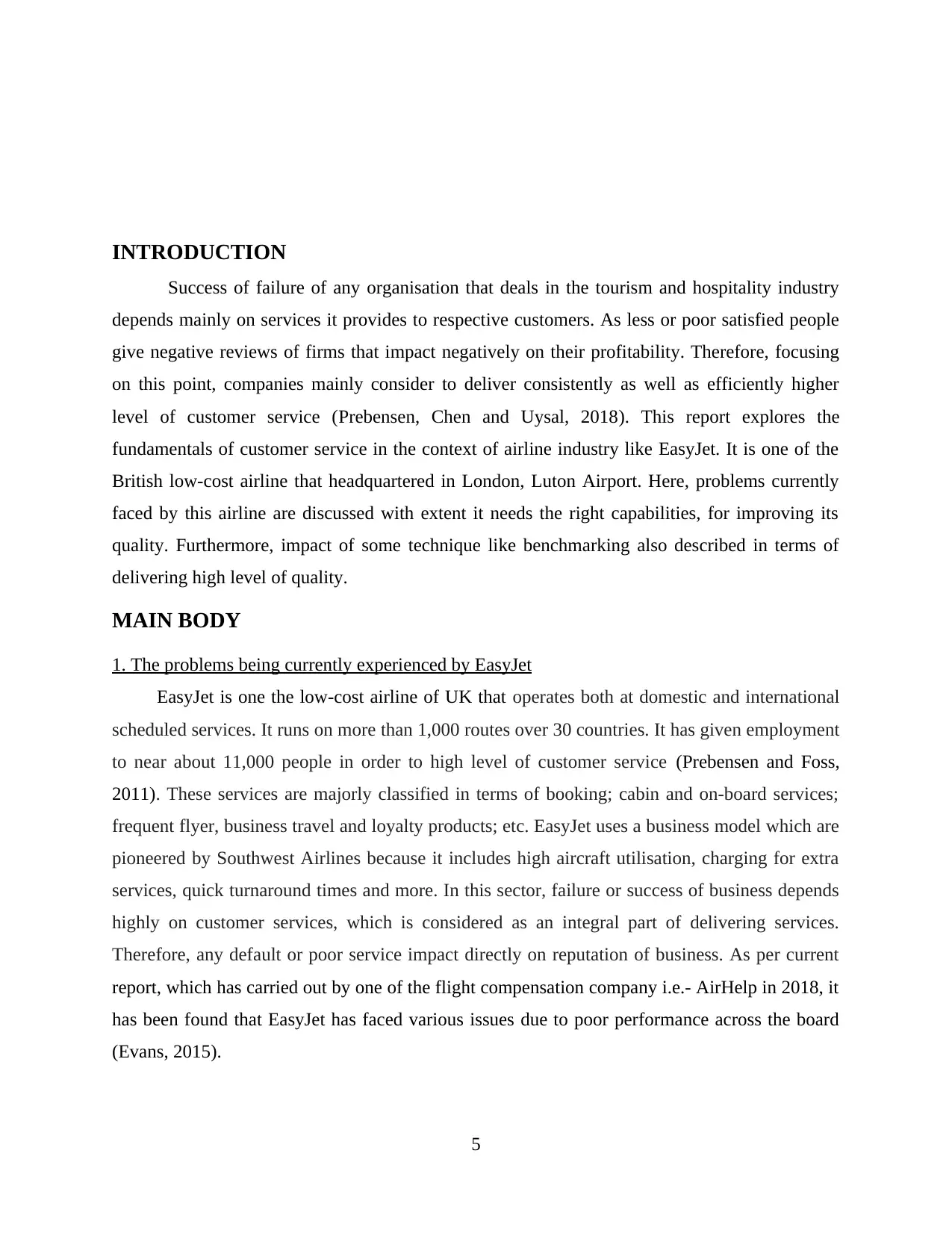
INTRODUCTION
Success of failure of any organisation that deals in the tourism and hospitality industry
depends mainly on services it provides to respective customers. As less or poor satisfied people
give negative reviews of firms that impact negatively on their profitability. Therefore, focusing
on this point, companies mainly consider to deliver consistently as well as efficiently higher
level of customer service (Prebensen, Chen and Uysal, 2018). This report explores the
fundamentals of customer service in the context of airline industry like EasyJet. It is one of the
British low-cost airline that headquartered in London, Luton Airport. Here, problems currently
faced by this airline are discussed with extent it needs the right capabilities, for improving its
quality. Furthermore, impact of some technique like benchmarking also described in terms of
delivering high level of quality.
MAIN BODY
1. The problems being currently experienced by EasyJet
EasyJet is one the low-cost airline of UK that operates both at domestic and international
scheduled services. It runs on more than 1,000 routes over 30 countries. It has given employment
to near about 11,000 people in order to high level of customer service (Prebensen and Foss,
2011). These services are majorly classified in terms of booking; cabin and on-board services;
frequent flyer, business travel and loyalty products; etc. EasyJet uses a business model which are
pioneered by Southwest Airlines because it includes high aircraft utilisation, charging for extra
services, quick turnaround times and more. In this sector, failure or success of business depends
highly on customer services, which is considered as an integral part of delivering services.
Therefore, any default or poor service impact directly on reputation of business. As per current
report, which has carried out by one of the flight compensation company i.e.- AirHelp in 2018, it
has been found that EasyJet has faced various issues due to poor performance across the board
(Evans, 2015).
5
Success of failure of any organisation that deals in the tourism and hospitality industry
depends mainly on services it provides to respective customers. As less or poor satisfied people
give negative reviews of firms that impact negatively on their profitability. Therefore, focusing
on this point, companies mainly consider to deliver consistently as well as efficiently higher
level of customer service (Prebensen, Chen and Uysal, 2018). This report explores the
fundamentals of customer service in the context of airline industry like EasyJet. It is one of the
British low-cost airline that headquartered in London, Luton Airport. Here, problems currently
faced by this airline are discussed with extent it needs the right capabilities, for improving its
quality. Furthermore, impact of some technique like benchmarking also described in terms of
delivering high level of quality.
MAIN BODY
1. The problems being currently experienced by EasyJet
EasyJet is one the low-cost airline of UK that operates both at domestic and international
scheduled services. It runs on more than 1,000 routes over 30 countries. It has given employment
to near about 11,000 people in order to high level of customer service (Prebensen and Foss,
2011). These services are majorly classified in terms of booking; cabin and on-board services;
frequent flyer, business travel and loyalty products; etc. EasyJet uses a business model which are
pioneered by Southwest Airlines because it includes high aircraft utilisation, charging for extra
services, quick turnaround times and more. In this sector, failure or success of business depends
highly on customer services, which is considered as an integral part of delivering services.
Therefore, any default or poor service impact directly on reputation of business. As per current
report, which has carried out by one of the flight compensation company i.e.- AirHelp in 2018, it
has been found that EasyJet has faced various issues due to poor performance across the board
(Evans, 2015).
5
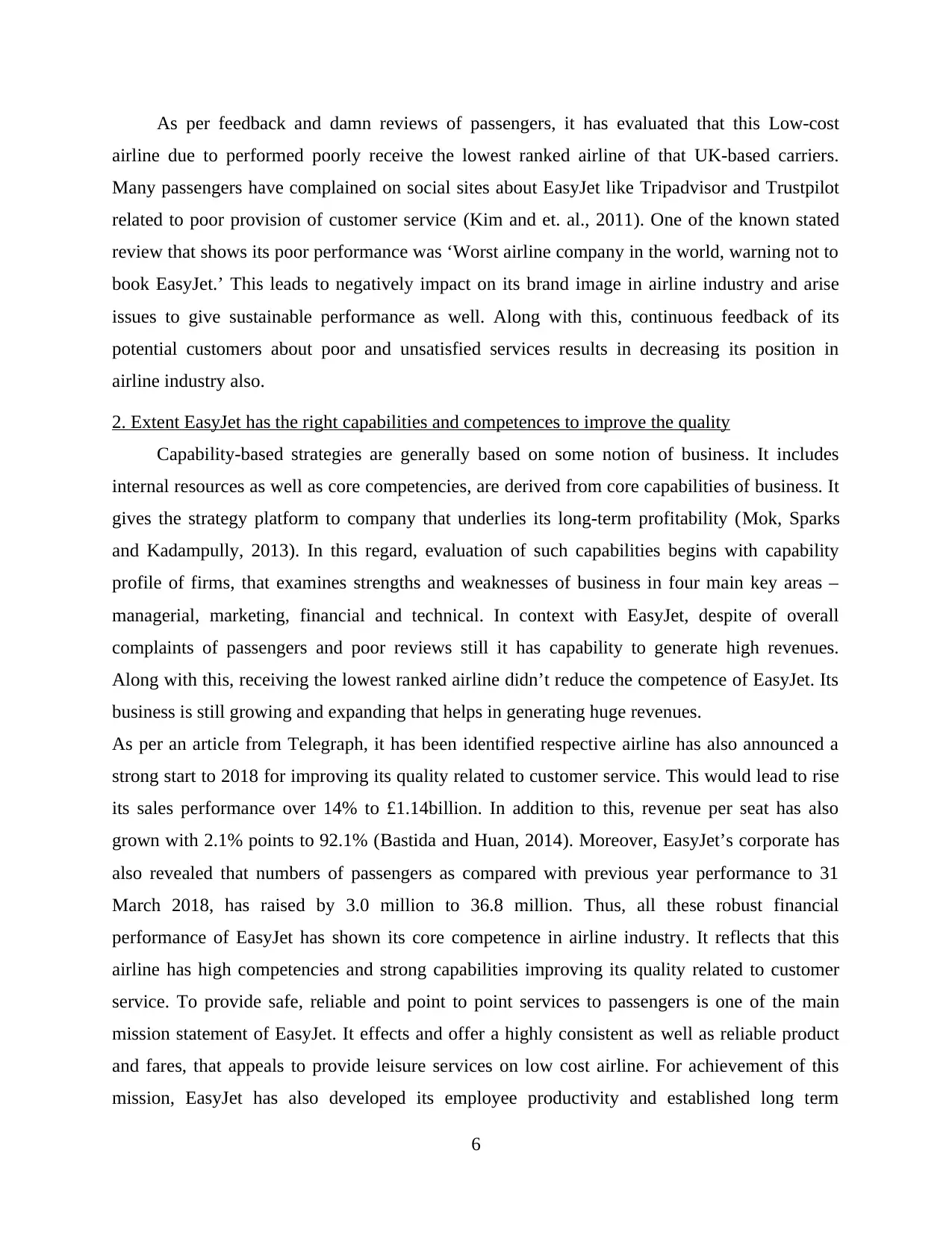
As per feedback and damn reviews of passengers, it has evaluated that this Low-cost
airline due to performed poorly receive the lowest ranked airline of that UK-based carriers.
Many passengers have complained on social sites about EasyJet like Tripadvisor and Trustpilot
related to poor provision of customer service (Kim and et. al., 2011). One of the known stated
review that shows its poor performance was ‘Worst airline company in the world, warning not to
book EasyJet.’ This leads to negatively impact on its brand image in airline industry and arise
issues to give sustainable performance as well. Along with this, continuous feedback of its
potential customers about poor and unsatisfied services results in decreasing its position in
airline industry also.
2. Extent EasyJet has the right capabilities and competences to improve the quality
Capability-based strategies are generally based on some notion of business. It includes
internal resources as well as core competencies, are derived from core capabilities of business. It
gives the strategy platform to company that underlies its long-term profitability (Mok, Sparks
and Kadampully, 2013). In this regard, evaluation of such capabilities begins with capability
profile of firms, that examines strengths and weaknesses of business in four main key areas –
managerial, marketing, financial and technical. In context with EasyJet, despite of overall
complaints of passengers and poor reviews still it has capability to generate high revenues.
Along with this, receiving the lowest ranked airline didn’t reduce the competence of EasyJet. Its
business is still growing and expanding that helps in generating huge revenues.
As per an article from Telegraph, it has been identified respective airline has also announced a
strong start to 2018 for improving its quality related to customer service. This would lead to rise
its sales performance over 14% to £1.14billion. In addition to this, revenue per seat has also
grown with 2.1% points to 92.1% (Bastida and Huan, 2014). Moreover, EasyJet’s corporate has
also revealed that numbers of passengers as compared with previous year performance to 31
March 2018, has raised by 3.0 million to 36.8 million. Thus, all these robust financial
performance of EasyJet has shown its core competence in airline industry. It reflects that this
airline has high competencies and strong capabilities improving its quality related to customer
service. To provide safe, reliable and point to point services to passengers is one of the main
mission statement of EasyJet. It effects and offer a highly consistent as well as reliable product
and fares, that appeals to provide leisure services on low cost airline. For achievement of this
mission, EasyJet has also developed its employee productivity and established long term
6
airline due to performed poorly receive the lowest ranked airline of that UK-based carriers.
Many passengers have complained on social sites about EasyJet like Tripadvisor and Trustpilot
related to poor provision of customer service (Kim and et. al., 2011). One of the known stated
review that shows its poor performance was ‘Worst airline company in the world, warning not to
book EasyJet.’ This leads to negatively impact on its brand image in airline industry and arise
issues to give sustainable performance as well. Along with this, continuous feedback of its
potential customers about poor and unsatisfied services results in decreasing its position in
airline industry also.
2. Extent EasyJet has the right capabilities and competences to improve the quality
Capability-based strategies are generally based on some notion of business. It includes
internal resources as well as core competencies, are derived from core capabilities of business. It
gives the strategy platform to company that underlies its long-term profitability (Mok, Sparks
and Kadampully, 2013). In this regard, evaluation of such capabilities begins with capability
profile of firms, that examines strengths and weaknesses of business in four main key areas –
managerial, marketing, financial and technical. In context with EasyJet, despite of overall
complaints of passengers and poor reviews still it has capability to generate high revenues.
Along with this, receiving the lowest ranked airline didn’t reduce the competence of EasyJet. Its
business is still growing and expanding that helps in generating huge revenues.
As per an article from Telegraph, it has been identified respective airline has also announced a
strong start to 2018 for improving its quality related to customer service. This would lead to rise
its sales performance over 14% to £1.14billion. In addition to this, revenue per seat has also
grown with 2.1% points to 92.1% (Bastida and Huan, 2014). Moreover, EasyJet’s corporate has
also revealed that numbers of passengers as compared with previous year performance to 31
March 2018, has raised by 3.0 million to 36.8 million. Thus, all these robust financial
performance of EasyJet has shown its core competence in airline industry. It reflects that this
airline has high competencies and strong capabilities improving its quality related to customer
service. To provide safe, reliable and point to point services to passengers is one of the main
mission statement of EasyJet. It effects and offer a highly consistent as well as reliable product
and fares, that appeals to provide leisure services on low cost airline. For achievement of this
mission, EasyJet has also developed its employee productivity and established long term
6
⊘ This is a preview!⊘
Do you want full access?
Subscribe today to unlock all pages.

Trusted by 1+ million students worldwide
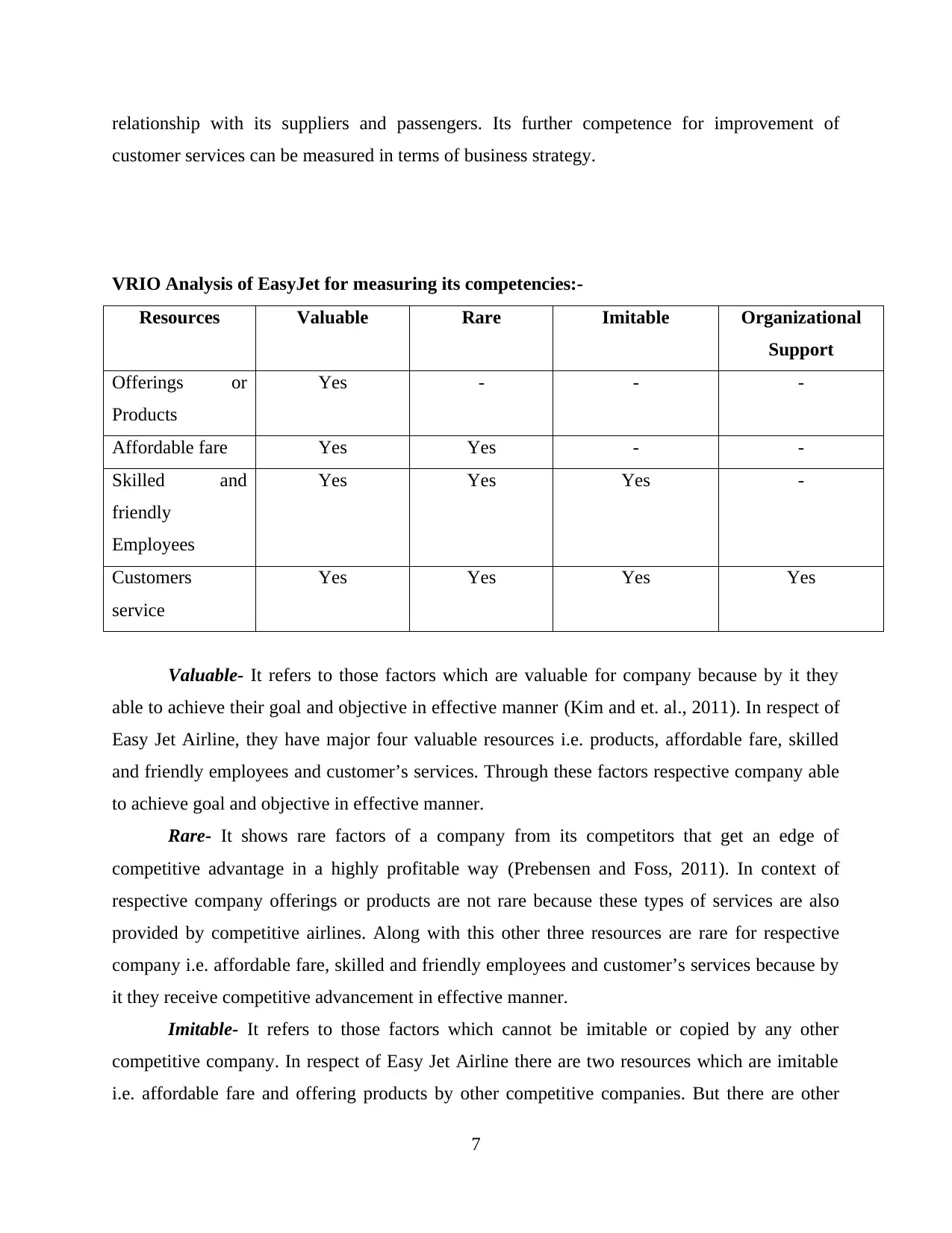
relationship with its suppliers and passengers. Its further competence for improvement of
customer services can be measured in terms of business strategy.
VRIO Analysis of EasyJet for measuring its competencies:-
Resources Valuable Rare Imitable Organizational
Support
Offerings or
Products
Yes - - -
Affordable fare Yes Yes - -
Skilled and
friendly
Employees
Yes Yes Yes -
Customers
service
Yes Yes Yes Yes
Valuable- It refers to those factors which are valuable for company because by it they
able to achieve their goal and objective in effective manner (Kim and et. al., 2011). In respect of
Easy Jet Airline, they have major four valuable resources i.e. products, affordable fare, skilled
and friendly employees and customer’s services. Through these factors respective company able
to achieve goal and objective in effective manner.
Rare- It shows rare factors of a company from its competitors that get an edge of
competitive advantage in a highly profitable way (Prebensen and Foss, 2011). In context of
respective company offerings or products are not rare because these types of services are also
provided by competitive airlines. Along with this other three resources are rare for respective
company i.e. affordable fare, skilled and friendly employees and customer’s services because by
it they receive competitive advancement in effective manner.
Imitable- It refers to those factors which cannot be imitable or copied by any other
competitive company. In respect of Easy Jet Airline there are two resources which are imitable
i.e. affordable fare and offering products by other competitive companies. But there are other
7
customer services can be measured in terms of business strategy.
VRIO Analysis of EasyJet for measuring its competencies:-
Resources Valuable Rare Imitable Organizational
Support
Offerings or
Products
Yes - - -
Affordable fare Yes Yes - -
Skilled and
friendly
Employees
Yes Yes Yes -
Customers
service
Yes Yes Yes Yes
Valuable- It refers to those factors which are valuable for company because by it they
able to achieve their goal and objective in effective manner (Kim and et. al., 2011). In respect of
Easy Jet Airline, they have major four valuable resources i.e. products, affordable fare, skilled
and friendly employees and customer’s services. Through these factors respective company able
to achieve goal and objective in effective manner.
Rare- It shows rare factors of a company from its competitors that get an edge of
competitive advantage in a highly profitable way (Prebensen and Foss, 2011). In context of
respective company offerings or products are not rare because these types of services are also
provided by competitive airlines. Along with this other three resources are rare for respective
company i.e. affordable fare, skilled and friendly employees and customer’s services because by
it they receive competitive advancement in effective manner.
Imitable- It refers to those factors which cannot be imitable or copied by any other
competitive company. In respect of Easy Jet Airline there are two resources which are imitable
i.e. affordable fare and offering products by other competitive companies. But there are other
7
Paraphrase This Document
Need a fresh take? Get an instant paraphrase of this document with our AI Paraphraser
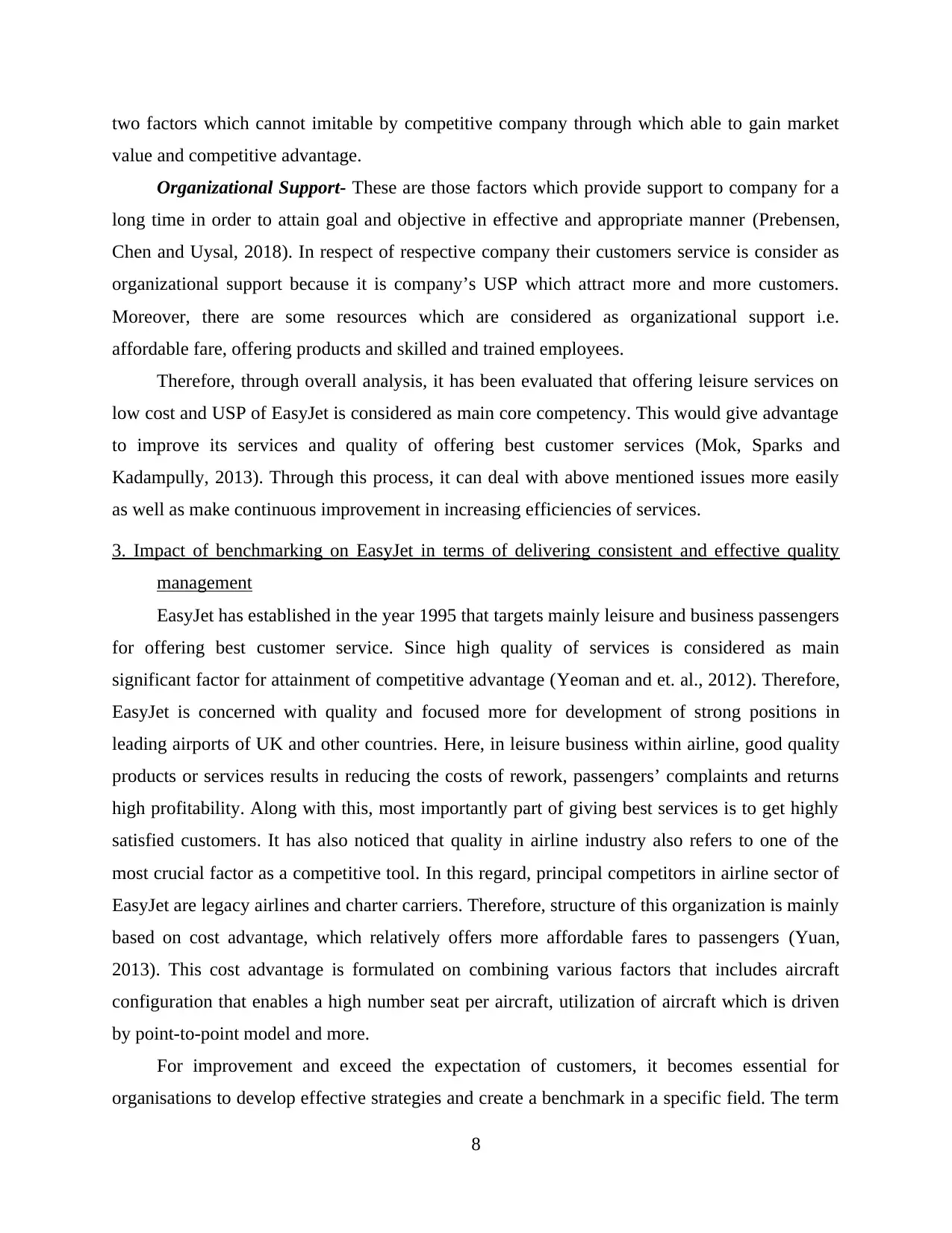
two factors which cannot imitable by competitive company through which able to gain market
value and competitive advantage.
Organizational Support- These are those factors which provide support to company for a
long time in order to attain goal and objective in effective and appropriate manner (Prebensen,
Chen and Uysal, 2018). In respect of respective company their customers service is consider as
organizational support because it is company’s USP which attract more and more customers.
Moreover, there are some resources which are considered as organizational support i.e.
affordable fare, offering products and skilled and trained employees.
Therefore, through overall analysis, it has been evaluated that offering leisure services on
low cost and USP of EasyJet is considered as main core competency. This would give advantage
to improve its services and quality of offering best customer services (Mok, Sparks and
Kadampully, 2013). Through this process, it can deal with above mentioned issues more easily
as well as make continuous improvement in increasing efficiencies of services.
3. Impact of benchmarking on EasyJet in terms of delivering consistent and effective quality
management
EasyJet has established in the year 1995 that targets mainly leisure and business passengers
for offering best customer service. Since high quality of services is considered as main
significant factor for attainment of competitive advantage (Yeoman and et. al., 2012). Therefore,
EasyJet is concerned with quality and focused more for development of strong positions in
leading airports of UK and other countries. Here, in leisure business within airline, good quality
products or services results in reducing the costs of rework, passengers’ complaints and returns
high profitability. Along with this, most importantly part of giving best services is to get highly
satisfied customers. It has also noticed that quality in airline industry also refers to one of the
most crucial factor as a competitive tool. In this regard, principal competitors in airline sector of
EasyJet are legacy airlines and charter carriers. Therefore, structure of this organization is mainly
based on cost advantage, which relatively offers more affordable fares to passengers (Yuan,
2013). This cost advantage is formulated on combining various factors that includes aircraft
configuration that enables a high number seat per aircraft, utilization of aircraft which is driven
by point-to-point model and more.
For improvement and exceed the expectation of customers, it becomes essential for
organisations to develop effective strategies and create a benchmark in a specific field. The term
8
value and competitive advantage.
Organizational Support- These are those factors which provide support to company for a
long time in order to attain goal and objective in effective and appropriate manner (Prebensen,
Chen and Uysal, 2018). In respect of respective company their customers service is consider as
organizational support because it is company’s USP which attract more and more customers.
Moreover, there are some resources which are considered as organizational support i.e.
affordable fare, offering products and skilled and trained employees.
Therefore, through overall analysis, it has been evaluated that offering leisure services on
low cost and USP of EasyJet is considered as main core competency. This would give advantage
to improve its services and quality of offering best customer services (Mok, Sparks and
Kadampully, 2013). Through this process, it can deal with above mentioned issues more easily
as well as make continuous improvement in increasing efficiencies of services.
3. Impact of benchmarking on EasyJet in terms of delivering consistent and effective quality
management
EasyJet has established in the year 1995 that targets mainly leisure and business passengers
for offering best customer service. Since high quality of services is considered as main
significant factor for attainment of competitive advantage (Yeoman and et. al., 2012). Therefore,
EasyJet is concerned with quality and focused more for development of strong positions in
leading airports of UK and other countries. Here, in leisure business within airline, good quality
products or services results in reducing the costs of rework, passengers’ complaints and returns
high profitability. Along with this, most importantly part of giving best services is to get highly
satisfied customers. It has also noticed that quality in airline industry also refers to one of the
most crucial factor as a competitive tool. In this regard, principal competitors in airline sector of
EasyJet are legacy airlines and charter carriers. Therefore, structure of this organization is mainly
based on cost advantage, which relatively offers more affordable fares to passengers (Yuan,
2013). This cost advantage is formulated on combining various factors that includes aircraft
configuration that enables a high number seat per aircraft, utilization of aircraft which is driven
by point-to-point model and more.
For improvement and exceed the expectation of customers, it becomes essential for
organisations to develop effective strategies and create a benchmark in a specific field. The term
8
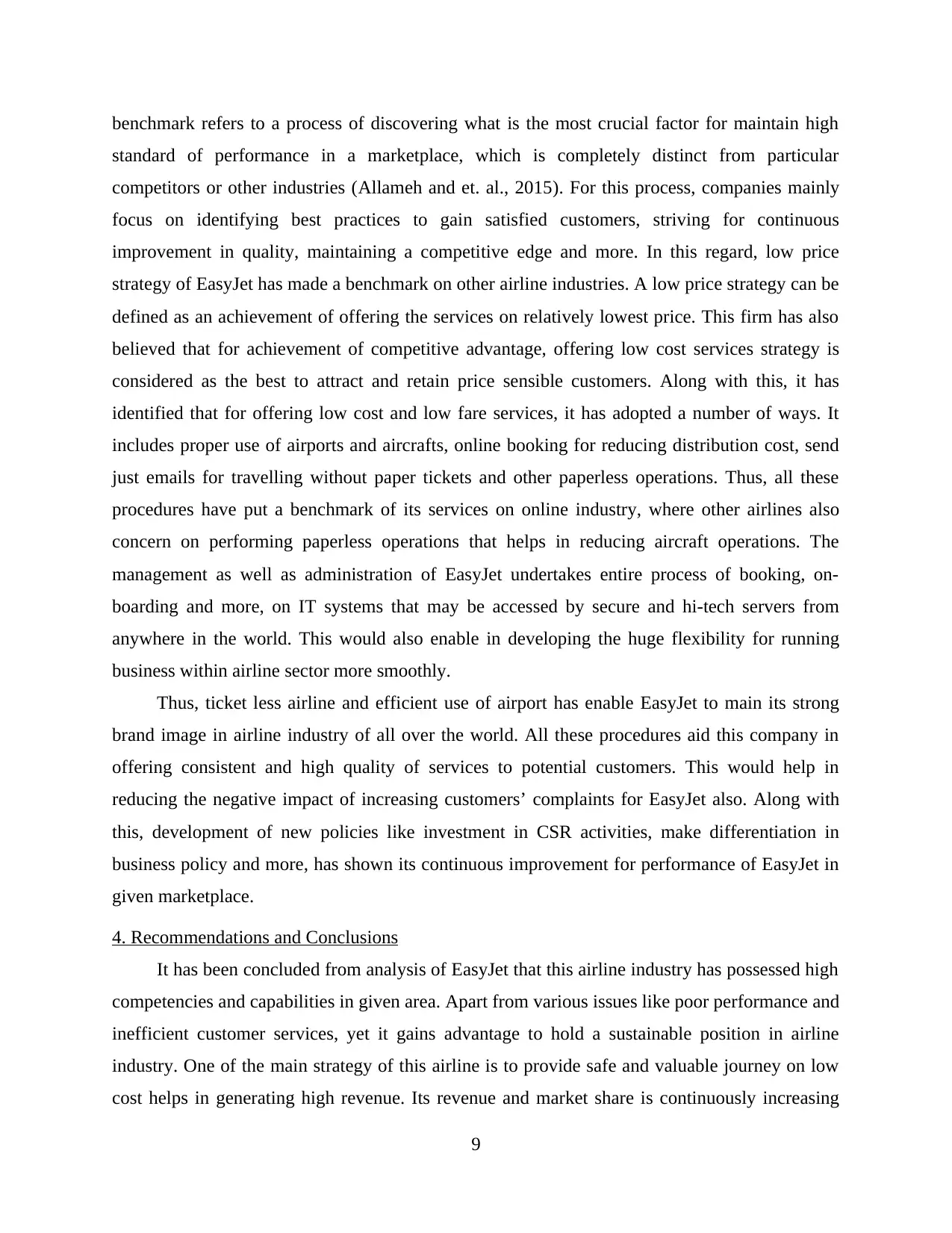
benchmark refers to a process of discovering what is the most crucial factor for maintain high
standard of performance in a marketplace, which is completely distinct from particular
competitors or other industries (Allameh and et. al., 2015). For this process, companies mainly
focus on identifying best practices to gain satisfied customers, striving for continuous
improvement in quality, maintaining a competitive edge and more. In this regard, low price
strategy of EasyJet has made a benchmark on other airline industries. A low price strategy can be
defined as an achievement of offering the services on relatively lowest price. This firm has also
believed that for achievement of competitive advantage, offering low cost services strategy is
considered as the best to attract and retain price sensible customers. Along with this, it has
identified that for offering low cost and low fare services, it has adopted a number of ways. It
includes proper use of airports and aircrafts, online booking for reducing distribution cost, send
just emails for travelling without paper tickets and other paperless operations. Thus, all these
procedures have put a benchmark of its services on online industry, where other airlines also
concern on performing paperless operations that helps in reducing aircraft operations. The
management as well as administration of EasyJet undertakes entire process of booking, on-
boarding and more, on IT systems that may be accessed by secure and hi-tech servers from
anywhere in the world. This would also enable in developing the huge flexibility for running
business within airline sector more smoothly.
Thus, ticket less airline and efficient use of airport has enable EasyJet to main its strong
brand image in airline industry of all over the world. All these procedures aid this company in
offering consistent and high quality of services to potential customers. This would help in
reducing the negative impact of increasing customers’ complaints for EasyJet also. Along with
this, development of new policies like investment in CSR activities, make differentiation in
business policy and more, has shown its continuous improvement for performance of EasyJet in
given marketplace.
4. Recommendations and Conclusions
It has been concluded from analysis of EasyJet that this airline industry has possessed high
competencies and capabilities in given area. Apart from various issues like poor performance and
inefficient customer services, yet it gains advantage to hold a sustainable position in airline
industry. One of the main strategy of this airline is to provide safe and valuable journey on low
cost helps in generating high revenue. Its revenue and market share is continuously increasing
9
standard of performance in a marketplace, which is completely distinct from particular
competitors or other industries (Allameh and et. al., 2015). For this process, companies mainly
focus on identifying best practices to gain satisfied customers, striving for continuous
improvement in quality, maintaining a competitive edge and more. In this regard, low price
strategy of EasyJet has made a benchmark on other airline industries. A low price strategy can be
defined as an achievement of offering the services on relatively lowest price. This firm has also
believed that for achievement of competitive advantage, offering low cost services strategy is
considered as the best to attract and retain price sensible customers. Along with this, it has
identified that for offering low cost and low fare services, it has adopted a number of ways. It
includes proper use of airports and aircrafts, online booking for reducing distribution cost, send
just emails for travelling without paper tickets and other paperless operations. Thus, all these
procedures have put a benchmark of its services on online industry, where other airlines also
concern on performing paperless operations that helps in reducing aircraft operations. The
management as well as administration of EasyJet undertakes entire process of booking, on-
boarding and more, on IT systems that may be accessed by secure and hi-tech servers from
anywhere in the world. This would also enable in developing the huge flexibility for running
business within airline sector more smoothly.
Thus, ticket less airline and efficient use of airport has enable EasyJet to main its strong
brand image in airline industry of all over the world. All these procedures aid this company in
offering consistent and high quality of services to potential customers. This would help in
reducing the negative impact of increasing customers’ complaints for EasyJet also. Along with
this, development of new policies like investment in CSR activities, make differentiation in
business policy and more, has shown its continuous improvement for performance of EasyJet in
given marketplace.
4. Recommendations and Conclusions
It has been concluded from analysis of EasyJet that this airline industry has possessed high
competencies and capabilities in given area. Apart from various issues like poor performance and
inefficient customer services, yet it gains advantage to hold a sustainable position in airline
industry. One of the main strategy of this airline is to provide safe and valuable journey on low
cost helps in generating high revenue. Its revenue and market share is continuously increasing
9
⊘ This is a preview!⊘
Do you want full access?
Subscribe today to unlock all pages.

Trusted by 1+ million students worldwide
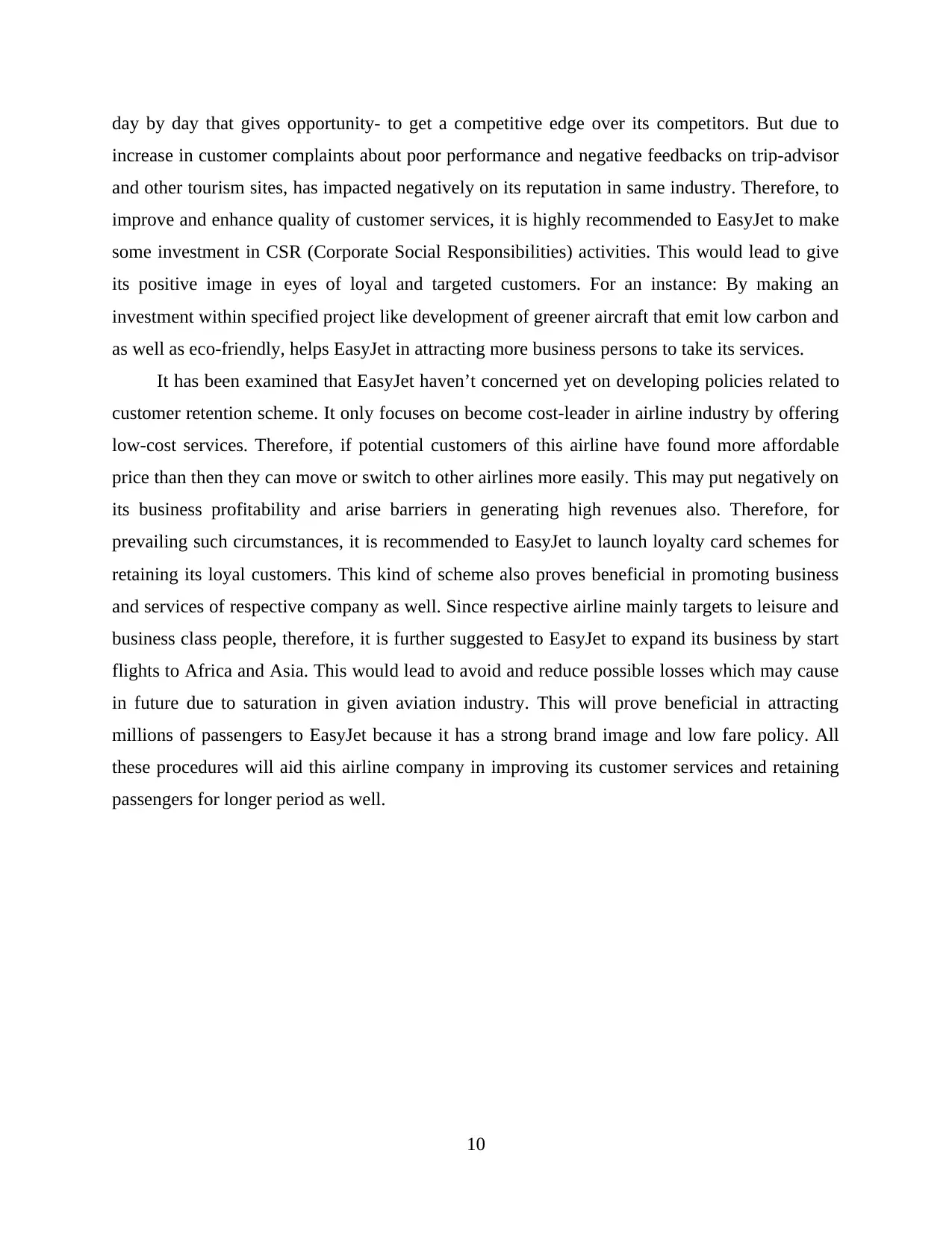
day by day that gives opportunity- to get a competitive edge over its competitors. But due to
increase in customer complaints about poor performance and negative feedbacks on trip-advisor
and other tourism sites, has impacted negatively on its reputation in same industry. Therefore, to
improve and enhance quality of customer services, it is highly recommended to EasyJet to make
some investment in CSR (Corporate Social Responsibilities) activities. This would lead to give
its positive image in eyes of loyal and targeted customers. For an instance: By making an
investment within specified project like development of greener aircraft that emit low carbon and
as well as eco-friendly, helps EasyJet in attracting more business persons to take its services.
It has been examined that EasyJet haven’t concerned yet on developing policies related to
customer retention scheme. It only focuses on become cost-leader in airline industry by offering
low-cost services. Therefore, if potential customers of this airline have found more affordable
price than then they can move or switch to other airlines more easily. This may put negatively on
its business profitability and arise barriers in generating high revenues also. Therefore, for
prevailing such circumstances, it is recommended to EasyJet to launch loyalty card schemes for
retaining its loyal customers. This kind of scheme also proves beneficial in promoting business
and services of respective company as well. Since respective airline mainly targets to leisure and
business class people, therefore, it is further suggested to EasyJet to expand its business by start
flights to Africa and Asia. This would lead to avoid and reduce possible losses which may cause
in future due to saturation in given aviation industry. This will prove beneficial in attracting
millions of passengers to EasyJet because it has a strong brand image and low fare policy. All
these procedures will aid this airline company in improving its customer services and retaining
passengers for longer period as well.
10
increase in customer complaints about poor performance and negative feedbacks on trip-advisor
and other tourism sites, has impacted negatively on its reputation in same industry. Therefore, to
improve and enhance quality of customer services, it is highly recommended to EasyJet to make
some investment in CSR (Corporate Social Responsibilities) activities. This would lead to give
its positive image in eyes of loyal and targeted customers. For an instance: By making an
investment within specified project like development of greener aircraft that emit low carbon and
as well as eco-friendly, helps EasyJet in attracting more business persons to take its services.
It has been examined that EasyJet haven’t concerned yet on developing policies related to
customer retention scheme. It only focuses on become cost-leader in airline industry by offering
low-cost services. Therefore, if potential customers of this airline have found more affordable
price than then they can move or switch to other airlines more easily. This may put negatively on
its business profitability and arise barriers in generating high revenues also. Therefore, for
prevailing such circumstances, it is recommended to EasyJet to launch loyalty card schemes for
retaining its loyal customers. This kind of scheme also proves beneficial in promoting business
and services of respective company as well. Since respective airline mainly targets to leisure and
business class people, therefore, it is further suggested to EasyJet to expand its business by start
flights to Africa and Asia. This would lead to avoid and reduce possible losses which may cause
in future due to saturation in given aviation industry. This will prove beneficial in attracting
millions of passengers to EasyJet because it has a strong brand image and low fare policy. All
these procedures will aid this airline company in improving its customer services and retaining
passengers for longer period as well.
10
Paraphrase This Document
Need a fresh take? Get an instant paraphrase of this document with our AI Paraphraser
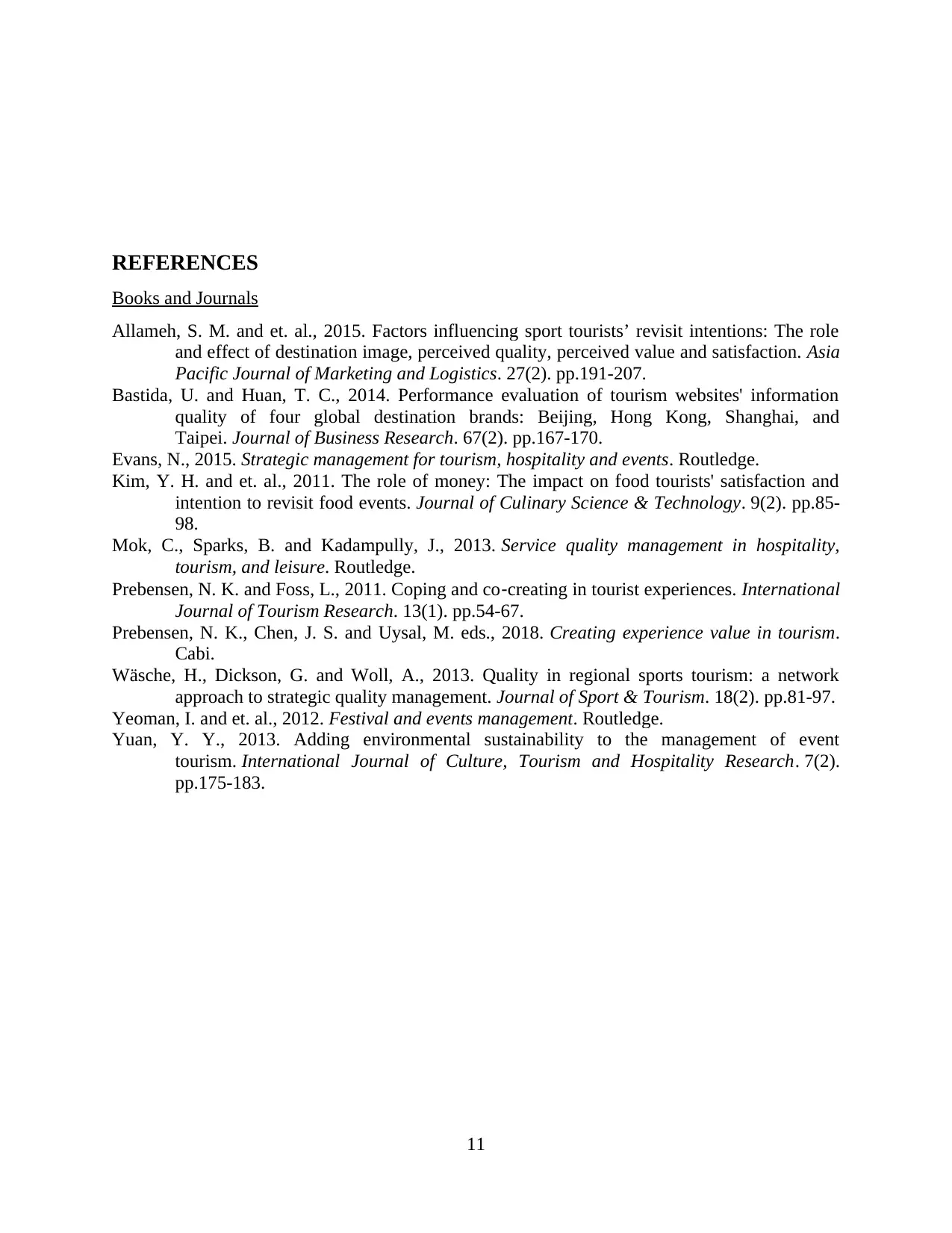
REFERENCES
Books and Journals
Allameh, S. M. and et. al., 2015. Factors influencing sport tourists’ revisit intentions: The role
and effect of destination image, perceived quality, perceived value and satisfaction. Asia
Pacific Journal of Marketing and Logistics. 27(2). pp.191-207.
Bastida, U. and Huan, T. C., 2014. Performance evaluation of tourism websites' information
quality of four global destination brands: Beijing, Hong Kong, Shanghai, and
Taipei. Journal of Business Research. 67(2). pp.167-170.
Evans, N., 2015. Strategic management for tourism, hospitality and events. Routledge.
Kim, Y. H. and et. al., 2011. The role of money: The impact on food tourists' satisfaction and
intention to revisit food events. Journal of Culinary Science & Technology. 9(2). pp.85-
98.
Mok, C., Sparks, B. and Kadampully, J., 2013. Service quality management in hospitality,
tourism, and leisure. Routledge.
Prebensen, N. K. and Foss, L., 2011. Coping and co‐creating in tourist experiences. International
Journal of Tourism Research. 13(1). pp.54-67.
Prebensen, N. K., Chen, J. S. and Uysal, M. eds., 2018. Creating experience value in tourism.
Cabi.
Wäsche, H., Dickson, G. and Woll, A., 2013. Quality in regional sports tourism: a network
approach to strategic quality management. Journal of Sport & Tourism. 18(2). pp.81-97.
Yeoman, I. and et. al., 2012. Festival and events management. Routledge.
Yuan, Y. Y., 2013. Adding environmental sustainability to the management of event
tourism. International Journal of Culture, Tourism and Hospitality Research. 7(2).
pp.175-183.
11
Books and Journals
Allameh, S. M. and et. al., 2015. Factors influencing sport tourists’ revisit intentions: The role
and effect of destination image, perceived quality, perceived value and satisfaction. Asia
Pacific Journal of Marketing and Logistics. 27(2). pp.191-207.
Bastida, U. and Huan, T. C., 2014. Performance evaluation of tourism websites' information
quality of four global destination brands: Beijing, Hong Kong, Shanghai, and
Taipei. Journal of Business Research. 67(2). pp.167-170.
Evans, N., 2015. Strategic management for tourism, hospitality and events. Routledge.
Kim, Y. H. and et. al., 2011. The role of money: The impact on food tourists' satisfaction and
intention to revisit food events. Journal of Culinary Science & Technology. 9(2). pp.85-
98.
Mok, C., Sparks, B. and Kadampully, J., 2013. Service quality management in hospitality,
tourism, and leisure. Routledge.
Prebensen, N. K. and Foss, L., 2011. Coping and co‐creating in tourist experiences. International
Journal of Tourism Research. 13(1). pp.54-67.
Prebensen, N. K., Chen, J. S. and Uysal, M. eds., 2018. Creating experience value in tourism.
Cabi.
Wäsche, H., Dickson, G. and Woll, A., 2013. Quality in regional sports tourism: a network
approach to strategic quality management. Journal of Sport & Tourism. 18(2). pp.81-97.
Yeoman, I. and et. al., 2012. Festival and events management. Routledge.
Yuan, Y. Y., 2013. Adding environmental sustainability to the management of event
tourism. International Journal of Culture, Tourism and Hospitality Research. 7(2).
pp.175-183.
11
1 out of 11
Related Documents
Your All-in-One AI-Powered Toolkit for Academic Success.
+13062052269
info@desklib.com
Available 24*7 on WhatsApp / Email
![[object Object]](/_next/static/media/star-bottom.7253800d.svg)
Unlock your academic potential
Copyright © 2020–2026 A2Z Services. All Rights Reserved. Developed and managed by ZUCOL.

